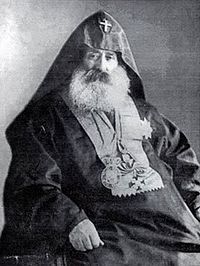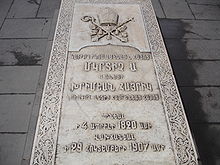- Mkrtich Khrimian
-
Mkrtich Khrimian
Խրիմեան Հայրիկ
Mkrtich KhrimianBorn April 4, 1820
Van, Vilayet of Van, Ottoman EmpireDied October 27, 1907 Church Armenian Apostolic Church Ordained monastery of Aghdamar Congregations served Van Offices held Armenian Patriarch of Constantinople Title Catholicos of the Holy See of St. Echmiadzin and All Armenians Mkrtich Khrimian (Armenian: Մկրտիչ Խրիմեան; April 4, 1820 – October 27, 1907), also known as Khrimian Hayrik (Armenian: Խրիմեան Հայրիկ), was an Armenian writer, newspaper editor, and political and religious leader. He served as the Armenian Patriarch of Constantinople (1869–1873), Prelate of Van (1880–1885) and Catholicos of All Armenians (1892–1907). He devoted his life to the betterment of the Armenian people, especially the peasantry in eastern Anatolia.
Khrimian was born in Van on April 4, 1820. After receiving his primary education, he studied Grabar or classical Armenian as well as Armenology.
Contents
Service in Van, 1854-1869
In 1854, he was ordained a priest and entered priesthood in the monastery of Aght'amar. Khrimian, a progressivist, was resented by his conservative brethren, so he left the monastery and gave himself to independent service. Elsewhere, his sermons won him public admiration and affection among Armenians. Khrimian was known to be an excellent orator, his speeches full of color and emotion. He established a printing press at Varagavank in Van, and thereafter launched Artsiv Vaspourakan (Eagle of Vaspourakan), which was the first periodical publication in Armenia.
Khrimian urged Armenian peasants to defend themselves against hostile Kurds. He was also successful in repealing illegal taxes imposed against Christian Armenians by the Ottoman government.
In 1855, Khrimyan launched “Artsui Vaspurakan”, the first periodical publication in Armenia. Garegin Shrvandztyants and Arsen Tokhmakhyan also worked on this periodical together with other pupils of a school founded by Khrimyan.
In 1857 later Khrimyan became the head of Taron, the dean of Saint Karapet seminary.
Armenian Patriarch of Constantinople, 1869-1873
In 1869, Khrimyan was elected Patriarch of Constantinople. Five years later he resigned this position and began his struggle against darkness and injustice. Carrying out an ambitious plan to enlighten his people, Khrimyan was thwarted in his efforts by the antagonism of fellow clergy who presented numerous obstacles to his work.
In 1876, on occasion of fire and robbery of Van, Khrimyan wrote “Vangoyzh”, an inspirational appeal for efficient measures instead of complaining of losses and difficulties., When the Russo-Turkish war broke out, he wrote “Haygoyzh”. These two works were enough to proclaim him “Khorenatsi of the 19th century.”* He also wrote “Heavenly Land”, “A Grandfather and a Grandson” and others. Most of Khrimyan’s work greatly influenced the character and social thought of the people of his time.
In 1876, Khrimyan published “His Time and Counsel” in which he expressed his thoughts and views of the constitution of the Ottoman Empire.
In 1878, Khrimyan headed the delegation to represent the will of Armenian people at the Berlin Conference. Upon his return he stated in an eloquent speech entitled, “The Paper Ladle,” that the hopes of the Armenian people for self-determination were ignored by the European community of nations.
Prelate of Van, 1880-1885
In 1878, Khrimyan sent his aid to the starving population of Van and founded an orphanage. In 1878, He began to serve as the Prelate of Van whose seat was at Varagavank.
In 1885 Khrimyan Hayrik was recalled to Constantinople. Turkish authorities did not appreciate his activities.
Later he was sent to Jerusalem, which, in fact, was an exile.
Catholicos of All Armenians, Echmiadzin (1892-1907)
In the eyes of native people the personality of Khrimyan rose instantly; therefore in 1892 Khrimyan Hayrik was unanimously elected Catholicos of All Armenians. He moved to the Mother See of Holy Echmiadzin as head of the Armenian Apostolic Church. Because of his fatherly love and dedication to the common people, Mkrtich Khrimian was affectionately called Khrimian "Hayrik", which means "father" in the Armenian language.
In 1903 the Czarist government of Imperial Russia ordered the confiscation of all Armenian ecclesiastical and educational properties. Khrimian, then acting Catholicos, waged a heroic struggle against the decision, which came to success in 1905 when the Czar published a decree reopening Armenian schools and returning church properties.
In 1907 Catholicos Khrimyan died leaving a grieving nation. Khrimyan’s life was an outstanding and extraordinary example of a leader’s dynamic accomplishment in drawing his people closer and closer to their native land and sense of nationhood, both physically and spiritually.
External links
Preceded by
Magar ICatholicoi of the Holy See of St. Echmiadzin and All Armenians
1892–1907Succeeded by
Matthew IICategories:- Armenian Patriarchs of Constantinople
- Catholicoi of Armenia
- Armenian writers
- 1820 births
- 1907 deaths
- People from Van
- Armenian Oriental Orthodox Christians
- Ottoman Armenians
Wikimedia Foundation. 2010.


